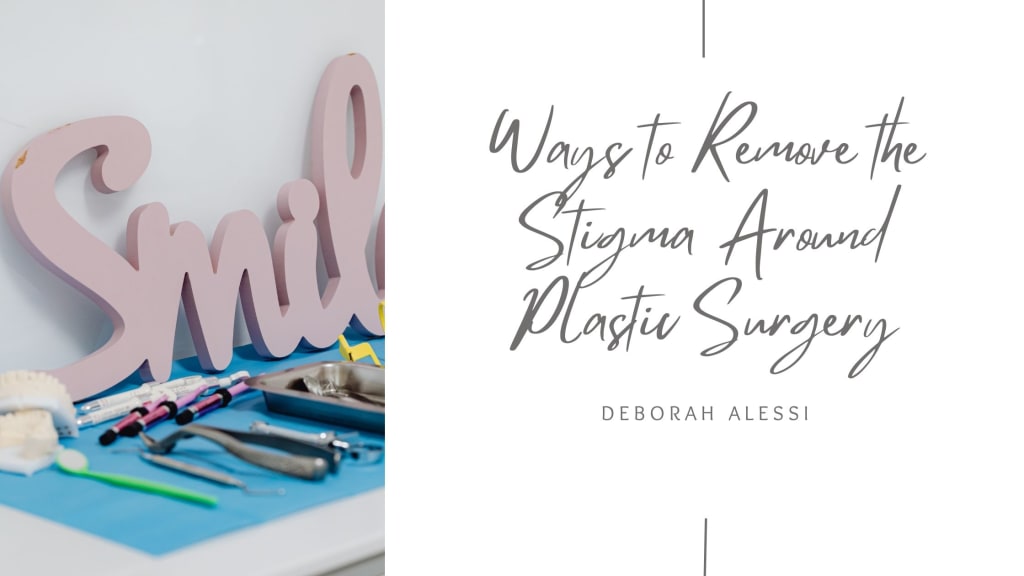Ways to Remove the Stigma Around Plastic Surgery
Deborah Alessi on Ways to Remove the Stigma Around Plastic Surgery

Plastic surgery can be a controversial field in medicine. It is surrounded by stigma and is often looked at negatively. People think plastic surgery procedures are the product of vanity and promote unreasonable beauty standards. While this may be true in some cases, plastic surgery is a much larger area of practice than most people realize and has a demonstrably positive impact on numerous patients.
Unfortunately, due to the stigma surrounding plastic surgery, many people who could benefit from it are afraid to explore the possibilities, and some patients are afraid to share their experiences due to fear of being judged. This can mean that patients go through recovery without support and contribute to continuing the stigma indefinitely. Below, you will find some ways you can help remove the stigma around plastic surgery.
Advocate and Educate
A lot of the stigma associated with plastic surgery is rooted in misinformation and myths. Therefore, advocacy and education are powerful tools that can help critics look at plastic surgery procedures more positively. Learning about the facts and benefits can help disprove the false messages and opinions that are perpetuated in our society.
For people who are afraid to explore the possibility of plastic surgery procedures, it can be helpful to research and learn about what these procedures actually look like. While some people may have relatively substantial surgeries with extended recovery time, many patients have noninvasive procedures that are minimally disruptive to their daily lives.
Another area that can benefit from education is the cost of plastic surgery. Many people have the false idea that plastic surgery is an expensive, out-of-pocket procedure that can only be afforded by the rich and famous. However, this is far from the truth. Many clinics offer payment plans and are committed to making their care available to people in need.
Highlight Non-Aesthetic Procedures
Many people believe that plastic surgery is all about aesthetics. People only get plastic surgery procedures to improve their physical appearance by reducing natural signs of aging, minimizing the appearance of fat, or augmenting certain physical aspects. However, this is far from the truth. While these are common practices within plastic surgery, there are numerous non-aesthetic applications.
One common example is reconstructive procedures for breast cancer survivors and victims of violence or traumatic injuries. Plastic surgeons can help alleviate discomfort and long-term challenges from body abnormalities resulting from congenital defects, such as cleft palates. They are also crucial in helping severe burn survivors by rebuilding damaged tissue, which is crucial to avoid long-term discomfort or disfigurement.
In some of these cases, it is true that the procedures may be purely cosmetic and not medically necessary. However, for people who have been through traumatic experiences, reconstructive plastic surgeries can be a crucial part of healing and recovery, helping to minimize physical reminders of the injury or illness and allowing victims to feel more comfortable in their own skin.
Share Positive Statistics and Stories
So, what are the statistics surrounding plastic surgery, especially procedures that are not medically necessary? Research shows that most plastic surgery patients have a positive experience and are grateful they did it. Most plastic surgery patients choose to undergo procedures due to underlying challenges with self-confidence and self-esteem. Regardless of how you feel about aesthetic procedures, numerous patients attest that their plastic surgery has improved their emotional well-being.
Statistics alone, however, are not always very compelling. What can really help combat the negative stigma surrounding plastic surgery is personal stories about individual experiences. If you have had a plastic surgery procedure, be open about your experience, sharing the positive ways it has changed your life. These stories can help people understand that plastic surgeons are actively improving the lives of others, not just catering to the upper class and perpetuating cultural beauty standards.
The average person probably hears “plastic surgery” and immediately thinks of things like Botox, tummy tucks, and breast augmentation. While these are all procedures performed by plastic surgeons, the industry is about far more than anti-aging and shallow pursuit of beauty. The stigma surrounding plastic surgery is incredibly harmful, leading to shame and hesitancy for people who could benefit from consulting with a plastic surgeon. We can all be a part of removing these harmful stigmas by advocating for the positive impact of plastic surgery procedures, educating critics on what is actually true, and highlighting the crucial role plastic surgeons play in helping people recover from traumatic injuries and experiences.
About Deborah Alessi

Deborah Alessi was born and raised in Glasgow, Scotland. Her career has brought her across the globe, from working with prominent families in the Middle East to founding an international nonprofit. She is well-known for her focus on people and desire to improve the lives of people she encounters. She is the founder of Beverly Hills Wellness and Aesthetics, a premier plastic surgery and wellness center with multiple locations across the globe. Currently based out of Dubai in the United Arab Emirates, Deborah loves exploring new places and cultures. Her passion project is Face Forward, a nonprofit organization helping victims of trauma and violence by providing free plastic surgery through a network of world-class surgeons, helping patients regain confidence and connect with a support network of fellow survivors.
About the Creator
Deborah Alessi
Deborah Alessi is a Dubai-based entrepreneur in the healthcare, aesthetics, and nonprofit spheres. She has founded two businesses: Face Forward, a nonprofit serving victims of domestic violence, and Beverly Hills Wellness and Aesthetics.






Comments
There are no comments for this story
Be the first to respond and start the conversation.